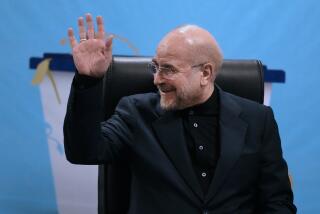Iraq election: Last-minute campaigning in Najaj
- Share via
NAJAF, IRAQ — Cellphones chirped here and there and children snapped pictures as Sheik Ali Mirza rallied his base in a final dash before polls opened today for provincial elections in the Shiite holy city of Najaf, his faith’s spiritual capital and a lucrative source of tourism revenue.
The Islamic Dawa Party leader glided into the room, his brown robe draped behind him, on Thursday, as campaigning officially came to a close. The expectant audience of tribal leaders, in black checkered headdresses, lined up to shake his hand and kiss his cheeks. His bulging brown eyes, snow-white beard and matching turban gave him an imposing air in a salon decorated with religious iconography of Imam Hussein, the spiritual linchpin of the Shiite Muslim faith, whose death is marked this time of year.
Mirza, the lead candidate on Prime Minister Nouri Maliki’s slate in Najaf, delivered a speech that liberally mixed religious lessons and swipes at his political rivals. He freely invoked the name of Grand Ayatollah Ali Sistani, the spiritual guide of Iraq’s Shiite majority.
“Sistani says you should do what you say,” Mirza told the men. “After the elections, some [winners] would hide themselves in closed buildings and cars with shaded windows. This is finished. We should stay in contact with men and women after the elections.”
Mirza had no compunction about attacking the Dawa party’s rival, the Supreme Islamic Iraqi Council. The solidarity that marked Shiite politics in the years immediately after the fall of Saddam Hussein and his Sunni-dominated Baath Party has fallen by the wayside with these elections.
The two Shiite parties are embroiled in a heated debate about how Iraq should be ruled: Maliki favors a strong central government, whereas the SIIC wants a semiautonomous Shiite region incorporating nine southern provinces. If the two parties still maintain niceties in Baghdad, Mirza doesn’t hide his disgust in a tour of Shiite salons.
Between rallies Thursday, he called Najaf the SIIC’s playground for corruption. He accused council leaders of blocking the provincial government from firing incompetent employees. He accused them of skimming money off state projects. “Najaf is the most corrupt of places,” he said as he drove through the city.
Mirza has relied heavily on his connection to the prime minister. A giant poster of the two men flutters from a building near a gate to Najaf’s old city. In meetings with tribesmen, he tells them: “I know the people in Baghdad. I can get you what you want.”
His supporters stand up and offer him poems to the prime minister, and Mirza listens raptly. Still, so much comes down to bartering and he has to deftly finesse dodgy requests, like talking to a judge about dismissing a murder case for the suspect’s family.
But even as Mirza pushes for victory, SIIC candidates are also hard at work to keep their hold on the council in this province, which they have governed since 2005.
SIIC is placing its bets on a cadre of young men that includes the deputy governor, Abdul Hussein Abtan, who has been credited with helping complete the Najaf airport last year -- his election posters show him posing in front of the building.
Another rising star for SIIC in Najaf is Khalid Jushaumi, the owner of a hotel and a new restaurant, which has a sparkling red front, outdoor tables, a fountain and bow-tied waiters from Bangladesh. Banners of a revered Shiite figure hang outside, along with Jushaumi’s campaign posters.
Jushaumi held court in his restaurant Friday morning. Dressed in a dark blazer, with his hair slicked back and wearing a black agate ring popular with pious Shiites, he smiled profusely. He promises to crack down on corruption and shakes his head at Mirza’s words.
“Each candidate, when they see that they will not get enough votes, starts to spread these rumors and make allegations,” Jushaumi said, as he relaxed in his restaurant, confidently, the day before the balloting.
--
Special correspondent Saad Fakhrildeen contributed to this report.
More to Read
Sign up for Essential California
The most important California stories and recommendations in your inbox every morning.
You may occasionally receive promotional content from the Los Angeles Times.













